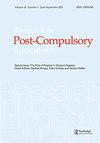国际流动项目中互动的社会形态:以在华丹麦学生为例
IF 0.9
Q3 EDUCATION & EDUCATIONAL RESEARCH
引用次数: 0
摘要
摘要从社会文化学习的角度,本研究利用多个定性数据来源,探讨了丹麦学生在中国短期国际流动性研究项目中互动的社会形态。尽管发现了各种策略、实践和话语模式,但研究结果表明,学生与海外侨民的社交活动最多,与当地华人的社交活动很少。尽管他们的内部社交活动创造了一些相互学习和了解中国文化的机会,但由于与当地人的互动有限,以及对当地“他人”的刻板印象,他们主要被发现是学习的制约因素,有误解的风险。该研究的结果表明,流动性研究计划的正式目标的理想与其实施实践之间存在差距,这对通过学生流动增加国际化的主流政治举措提出了挑战。社会文化学习设计在短期流动背景下的有效性也受到质疑。本文章由计算机程序翻译,如有差异,请以英文原文为准。
Social formation for interaction in international mobility programmes: a case of Danish students in China
ABSTRACT From a social cultural learning perspective, the study explored the social formations for interactions of Danish students during a short-term international mobility study programme in China, using multiple qualitative data sources. Although a variety of patterns of strategies, practices and discourses were identified, the findings suggest that the students socialised most with co-nationals and little with local Chinese. Although their internal socialisations created some opportunities to learn from each other and learn about Chinese culture, they were mainly found to be constraints to learning due to limited interaction with locals and stereotyping the local ‘others’, risking misunderstandings. The outcomes of the study identify a gap between the ideal of the mobility study programme’s formal objectives and the practice of its implementation, which challenges prevailing political initiatives to increase internationalisation through student mobility. Also questioned is the effectiveness of sociocultural learning design in the short-term mobility context.
求助全文
通过发布文献求助,成功后即可免费获取论文全文。
去求助
来源期刊

Research in Post-Compulsory Education
EDUCATION & EDUCATIONAL RESEARCH-
CiteScore
1.30
自引率
14.30%
发文量
31
期刊介绍:
Throughout the world, there is a growing awareness of the significance of vocational and post-compulsory education and training systems. The majority of countries are working hard to develop their provision, recognising the importance of post-compulsory education in providing educated and skilled people in sufficient numbers at appropriate levels to assist economic and social development. Research in Post-Compulsory Education, sponsored by the United Kingdom"s Further Education Research Association (FERA), recognises the need for more international research and analysis and the generation of relevant theory in order to identify policy needs and trends as well as priorities in this growing area.
 求助内容:
求助内容: 应助结果提醒方式:
应助结果提醒方式:


